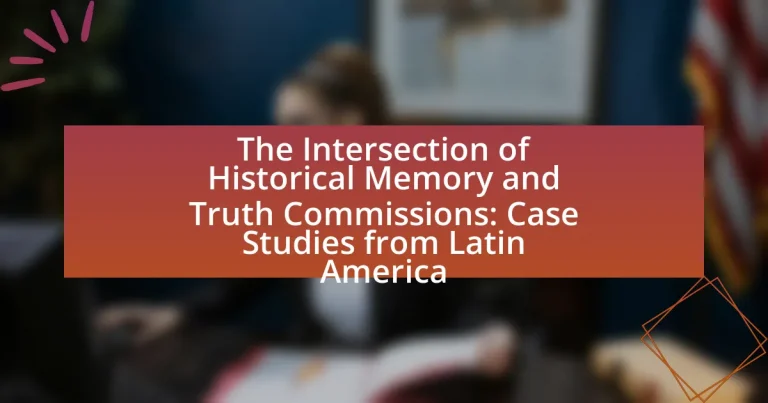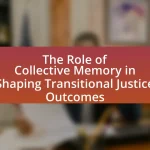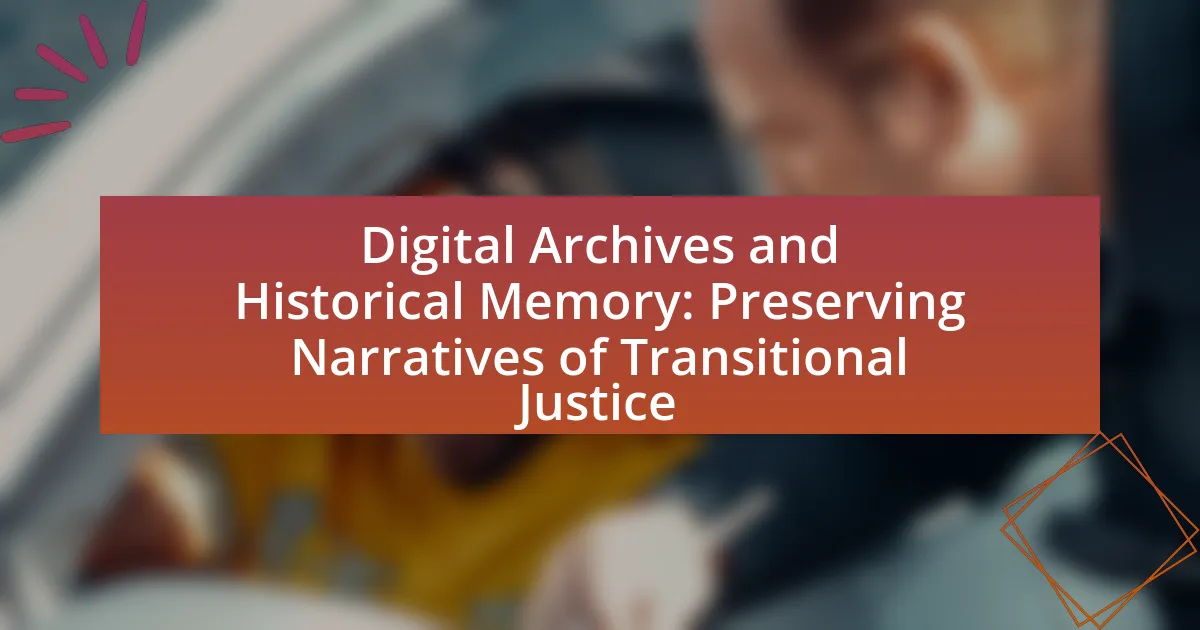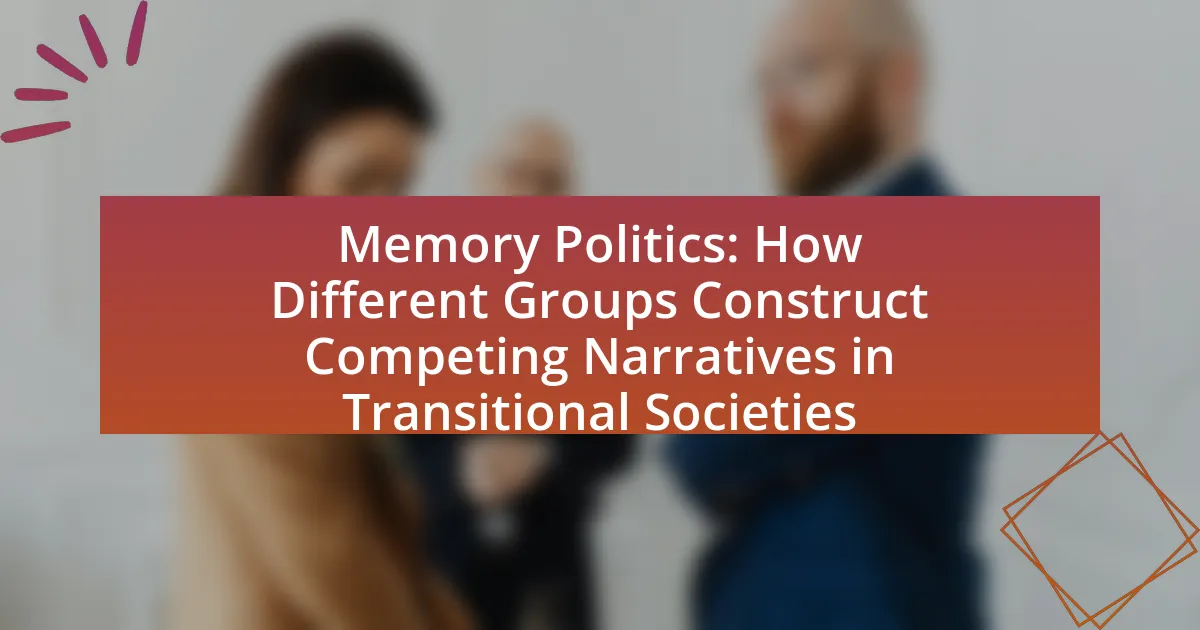The article examines the intersection of historical memory and truth commissions, particularly through case studies from Latin America. It highlights how truth commissions, such as those in Argentina, Chile, and South Africa, aim to uncover past human rights violations and foster societal healing by documenting atrocities and validating victims’ experiences. The article discusses the objectives of truth commissions, their impact on collective historical memory, and the challenges they face, while emphasizing the importance of these mechanisms in promoting reconciliation and accountability in post-conflict societies. Additionally, it explores best practices for future truth commissions to enhance historical memory and ensure the sustainability of their findings.
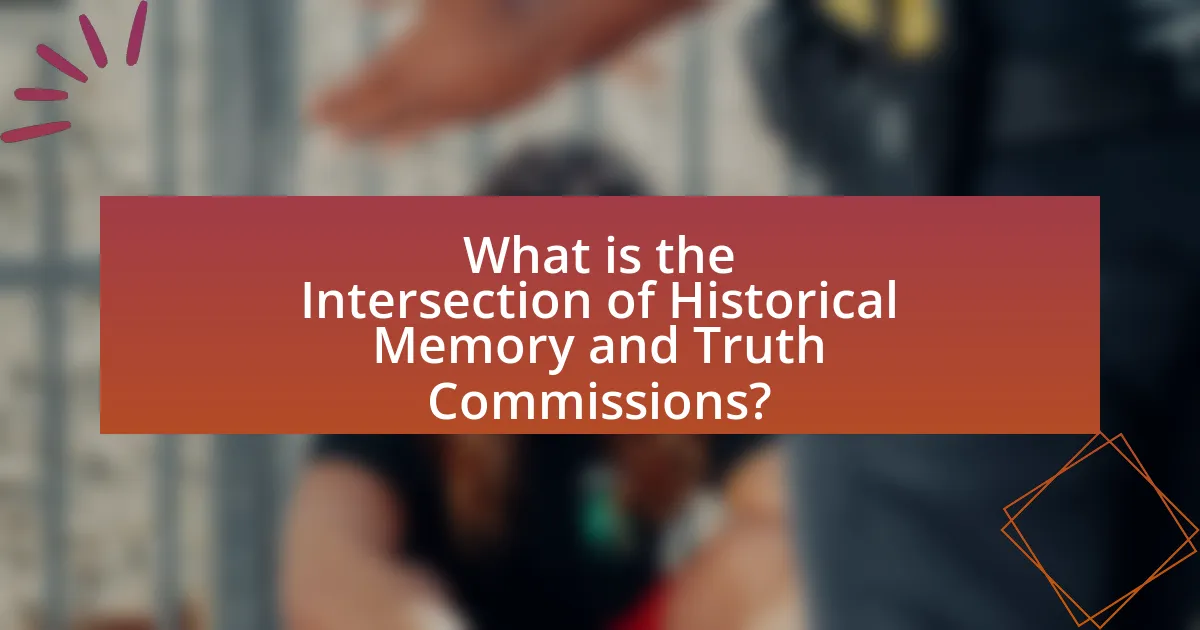
What is the Intersection of Historical Memory and Truth Commissions?
The intersection of historical memory and truth commissions lies in their shared goal of addressing past injustices and fostering societal healing. Truth commissions, such as those established in Argentina and South Africa, aim to uncover the truth about human rights violations, thereby contributing to the collective historical memory of a society. These commissions facilitate public acknowledgment of atrocities, which is essential for reconciliation and preventing future violence. For instance, the Comisión Nacional sobre la Desaparición de Personas (CONADEP) in Argentina documented thousands of cases of forced disappearances during the military dictatorship, significantly shaping the national narrative and collective memory regarding state terrorism. This process not only validates the experiences of victims but also informs future generations, ensuring that the lessons of history are not forgotten.
How do historical memory and truth commissions relate to each other?
Historical memory and truth commissions are interconnected as truth commissions serve to document and validate historical memory by investigating past human rights violations. Truth commissions, such as the Comisión Nacional de Verdad y Reconciliación in Chile, aim to uncover the truth about state-sponsored violence, thereby shaping collective memory and fostering societal healing. These commissions often produce reports that become key historical documents, influencing how societies remember and interpret their past, as seen in Argentina’s Nunca Más report, which has significantly impacted national discourse on human rights.
What role does historical memory play in shaping truth commissions?
Historical memory plays a crucial role in shaping truth commissions by providing a framework for understanding past injustices and guiding the processes of reconciliation. Truth commissions rely on collective memories of historical events to establish a narrative that acknowledges victims’ experiences and holds perpetrators accountable. For instance, in Argentina, the National Commission on the Disappearance of Persons (CONADEP) utilized testimonies from victims and their families to document human rights violations during the military dictatorship, thereby reinforcing the importance of historical memory in validating the experiences of those affected. This process not only aids in uncovering the truth but also fosters a shared understanding of the past, which is essential for building a foundation for future peace and justice.
How do truth commissions influence collective historical memory?
Truth commissions influence collective historical memory by documenting human rights violations and fostering public dialogue about past atrocities. These commissions, such as the Comisión Nacional de Verdad y Reconciliación in Chile, provide official accounts that challenge dominant narratives, thereby shaping how societies remember and interpret their history. By collecting testimonies from victims and perpetrators, truth commissions create a shared understanding of events, which can lead to a more informed and reconciled society. Research indicates that societies that engage with truth commissions often experience a shift in collective memory, as seen in post-apartheid South Africa, where the Truth and Reconciliation Commission played a crucial role in addressing the legacy of apartheid and promoting national healing.
Why are truth commissions important in post-conflict societies?
Truth commissions are important in post-conflict societies because they facilitate the process of reconciliation and healing by uncovering the truth about past human rights violations. These commissions provide a platform for victims to share their experiences, which helps to validate their suffering and fosters a collective memory that acknowledges the injustices faced. For instance, the Truth and Reconciliation Commission in South Africa played a crucial role in addressing the atrocities of apartheid, allowing for public testimonies that contributed to national healing and understanding. By documenting these events, truth commissions also promote accountability and deter future violations, as seen in the cases of Argentina and Chile, where commissions revealed state-sponsored violence and led to legal actions against perpetrators.
What objectives do truth commissions aim to achieve?
Truth commissions aim to achieve several key objectives, primarily focused on uncovering the truth about past human rights violations. These commissions seek to document and acknowledge the experiences of victims, promote accountability for perpetrators, and foster national reconciliation. For instance, the Truth and Reconciliation Commission in South Africa aimed to address the injustices of apartheid by revealing the truth about human rights abuses, which helped to facilitate healing and understanding among divided communities. Additionally, truth commissions often provide recommendations for institutional reforms to prevent future violations, thereby contributing to the establishment of a more just society.
How do truth commissions contribute to reconciliation processes?
Truth commissions contribute to reconciliation processes by uncovering the truth about past human rights violations and fostering dialogue among affected communities. These commissions investigate and document atrocities, providing a platform for victims to share their experiences, which helps to validate their suffering and promote healing. For example, the Truth and Reconciliation Commission in South Africa revealed the extent of apartheid-era abuses, allowing for public acknowledgment and fostering a collective memory that supports national healing. Additionally, truth commissions often recommend reparations and institutional reforms, addressing the root causes of conflict and promoting justice, which are essential for sustainable reconciliation.
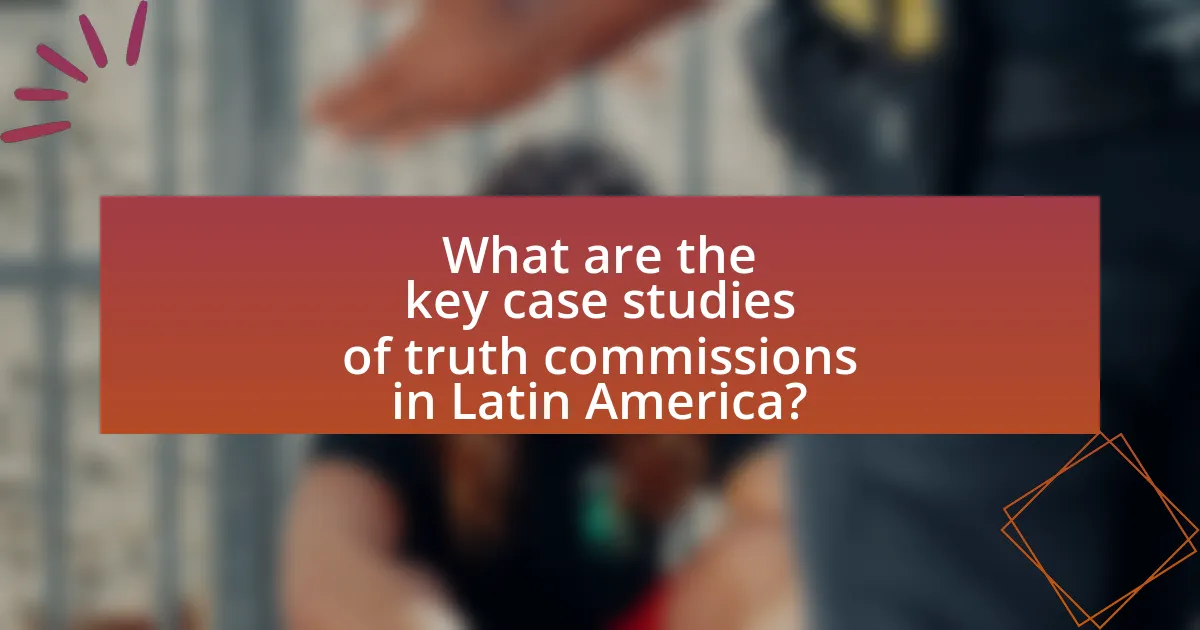
What are the key case studies of truth commissions in Latin America?
Key case studies of truth commissions in Latin America include the Comisión Nacional de Verdad y Reconciliación in Chile, established in 1991, which investigated human rights violations during the Pinochet regime, documenting over 3,000 deaths and disappearances. Another significant case is the Comisión de la Verdad y Reconciliación in Peru, created in 2001, which examined the internal conflict from 1980 to 2000, attributing around 69,000 deaths to violence, primarily involving the Shining Path and state forces. Additionally, the Comisión de la Verdad y la Reconciliación in El Salvador, formed in 1992, reported on the civil war’s atrocities, identifying over 75,000 deaths and extensive human rights abuses. These commissions aimed to uncover the truth, promote reconciliation, and provide a historical record of state violence and human rights violations in their respective countries.
Which countries in Latin America have implemented truth commissions?
Countries in Latin America that have implemented truth commissions include Argentina, Chile, Uruguay, Brazil, Guatemala, El Salvador, and Peru. These nations established truth commissions primarily to investigate human rights violations and state-sponsored violence during periods of dictatorship or civil conflict. For instance, Argentina’s National Commission on the Disappearance of Persons (CONADEP) was created in 1983 to address the forced disappearances during the military dictatorship from 1976 to 1983, leading to the publication of the report “Nunca Más,” which documented thousands of cases of human rights abuses. Similarly, the Truth Commission in Guatemala, established in 1997, aimed to uncover the truth about the internal armed conflict that lasted from 1960 to 1996, resulting in significant findings about the atrocities committed during that time.
What were the specific contexts that led to the establishment of these commissions?
The specific contexts that led to the establishment of truth commissions in Latin America included widespread human rights violations during authoritarian regimes, societal demands for accountability, and the need for national reconciliation. For instance, in Argentina, the Dirty War (1976-1983) resulted in thousands of disappearances, prompting the establishment of the National Commission on the Disappearance of Persons in 1983 to investigate these crimes. Similarly, in Chile, the Pinochet dictatorship (1973-1990) led to the creation of the National Commission on Truth and Reconciliation in 1990, driven by public outcry for justice and the documentation of atrocities. These commissions aimed to uncover the truth about past abuses, promote healing, and prevent future violations, reflecting a broader regional trend towards addressing historical injustices.
How did the outcomes of these commissions vary across different countries?
The outcomes of truth commissions in Latin America varied significantly across countries, reflecting differing political contexts, societal needs, and historical grievances. For instance, the Comisión Nacional de la Verdad y Reconciliación in Peru focused on human rights violations during the internal conflict, leading to a comprehensive report that acknowledged the suffering of victims, while the Comisión de la Verdad y la Reconciliación in Chile emphasized the need for national reconciliation after the Pinochet dictatorship, resulting in a public acknowledgment of state crimes but limited accountability for perpetrators. Additionally, in Argentina, the Nunca Más report documented state terrorism, leading to trials against military officials, showcasing a more confrontational approach to justice compared to other nations. These variations illustrate how each commission’s effectiveness and impact were shaped by local dynamics, including government cooperation, civil society engagement, and the existing legal framework.
What lessons can be learned from the Latin American experience?
The Latin American experience teaches the importance of truth commissions in addressing historical injustices and fostering reconciliation. Countries like Argentina and Chile utilized truth commissions to document human rights violations during authoritarian regimes, which helped acknowledge victims’ suffering and promote societal healing. For instance, the Argentine National Commission on the Disappearance of Persons (CONADEP) in 1984 documented over 8,000 cases of forced disappearances, providing a historical record that contributed to national dialogue and accountability. This demonstrates that truth-telling can be a crucial step in rebuilding trust in institutions and preventing future atrocities.
What challenges did truth commissions face in these case studies?
Truth commissions in Latin America faced significant challenges, including political resistance, lack of cooperation from state institutions, and societal divisions. Political resistance often manifested as government reluctance to acknowledge past atrocities, undermining the commissions’ authority and effectiveness. For instance, in Argentina, the military government obstructed the commission’s work, limiting access to crucial documents and testimonies. Additionally, lack of cooperation from state institutions hindered investigations, as seen in Guatemala, where the military and police were uncooperative, complicating the gathering of evidence. Societal divisions also posed challenges, as polarized communities often resisted reconciliation efforts, making it difficult for truth commissions to foster a unified narrative. These factors collectively impeded the ability of truth commissions to fulfill their mandates effectively.
How did the findings of these commissions impact historical narratives?
The findings of truth commissions significantly reshaped historical narratives by providing documented accounts of human rights abuses and state violence. For instance, the Comisión Nacional de la Verdad y Reconciliación in Chile revealed the extent of political repression during the Pinochet regime, leading to a broader acknowledgment of these events in public discourse and education. This documentation not only validated the experiences of victims but also challenged official narratives that had previously downplayed or denied such abuses. Consequently, these findings fostered a more nuanced understanding of history, encouraging societies to confront their past and promote reconciliation.
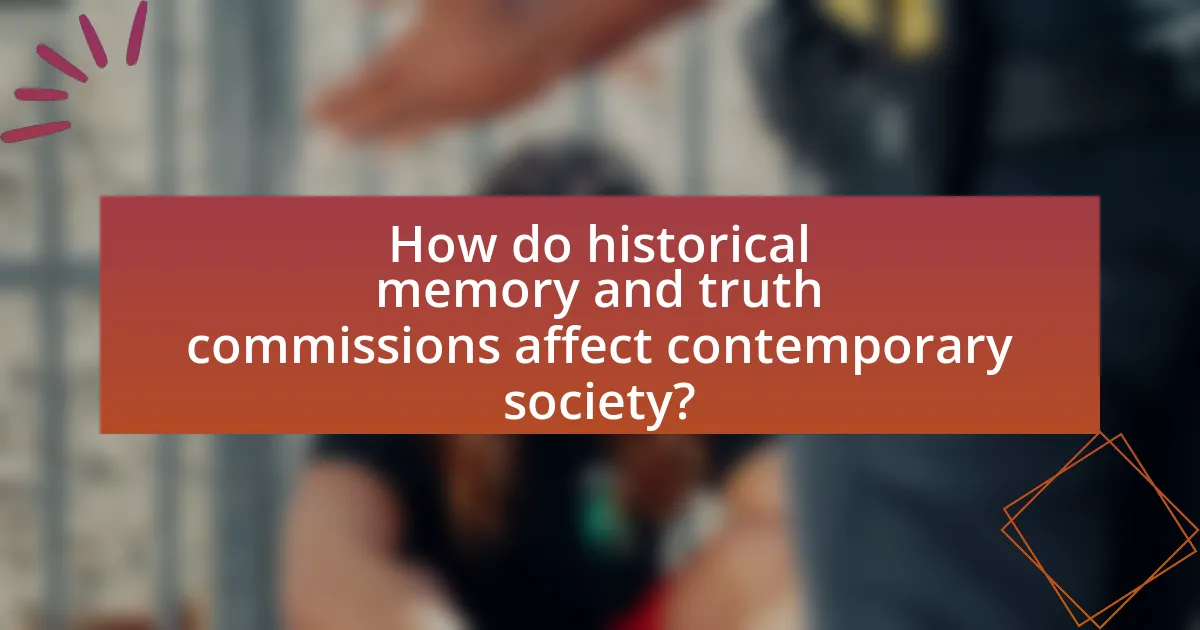
How do historical memory and truth commissions affect contemporary society?
Historical memory and truth commissions significantly influence contemporary society by fostering reconciliation and promoting accountability for past injustices. These mechanisms, such as the Truth and Reconciliation Commission in South Africa and similar initiatives in Latin America, aim to document human rights violations and acknowledge victims’ experiences. For instance, the Comisión Nacional de la Verdad y Reconciliación in Peru revealed over 69,000 deaths and disappearances during the internal conflict, which helped to validate victims’ narratives and encourage societal healing. By addressing historical grievances, truth commissions contribute to building a more just society, reducing the likelihood of future conflicts, and enhancing democratic governance.
What is the ongoing impact of truth commissions on current political landscapes?
Truth commissions have a significant ongoing impact on current political landscapes by fostering accountability, promoting reconciliation, and influencing public policy. For instance, in countries like Argentina and South Africa, truth commissions have led to the establishment of legal frameworks that address human rights violations, thereby shaping contemporary governance and legal practices. The Argentine National Commission on the Disappearance of Persons (CONADEP) documented human rights abuses during the military dictatorship, which not only informed public memory but also influenced subsequent legal actions against perpetrators. Similarly, the Truth and Reconciliation Commission in South Africa facilitated a national dialogue about apartheid, which continues to inform discussions on race relations and social justice. These commissions create a historical narrative that informs current political discourse, encourages civic engagement, and helps prevent the recurrence of past atrocities.
How do truth commissions influence public perceptions of justice?
Truth commissions influence public perceptions of justice by providing a platform for victims to share their experiences and by officially acknowledging past human rights violations. This acknowledgment fosters a sense of validation among victims and their communities, which can enhance the perceived legitimacy of the justice process. For example, the Comisión Nacional de la Verdad y Reconciliación in Peru documented atrocities committed during the internal conflict, leading to increased public awareness and understanding of the injustices faced by marginalized groups. Such documentation can shift societal attitudes towards accountability and the importance of historical memory, ultimately shaping a collective understanding of justice that emphasizes truth-telling and reconciliation over mere punitive measures.
What role do truth commissions play in addressing historical grievances today?
Truth commissions play a critical role in addressing historical grievances today by facilitating the acknowledgment of past injustices and promoting reconciliation within societies. These commissions investigate human rights violations, document testimonies from victims, and provide a platform for public acknowledgment of suffering, which is essential for healing. For instance, the Comisión Nacional de la Verdad y Reconciliación in Peru, established in 2001, documented over 69,000 deaths and disappearances during the internal conflict, helping to validate the experiences of victims and their families. This process not only fosters societal healing but also contributes to the establishment of historical records that can prevent future atrocities by holding perpetrators accountable and promoting a culture of human rights.
What best practices can be derived from the intersection of historical memory and truth commissions?
Best practices derived from the intersection of historical memory and truth commissions include fostering inclusive dialogue, ensuring transparency in processes, and prioritizing victim-centered approaches. Inclusive dialogue allows diverse perspectives to be represented, which is crucial for building a comprehensive historical narrative. For instance, the Truth and Reconciliation Commission in South Africa emphasized the importance of including voices from various communities, which helped to create a more holistic understanding of the past. Transparency in the processes of truth commissions builds public trust and encourages participation, as seen in the Comisión de la Verdad y Reconciliación in Peru, where open hearings allowed for community engagement and accountability. Lastly, prioritizing victim-centered approaches ensures that the needs and experiences of victims are at the forefront, as demonstrated by the National Commission on the Disappeared in Argentina, which focused on the rights and stories of those affected by state violence. These practices collectively enhance the effectiveness of truth commissions in addressing historical injustices and fostering reconciliation.
How can future truth commissions be designed to enhance historical memory?
Future truth commissions can be designed to enhance historical memory by incorporating inclusive public participation and utilizing diverse media for documentation. Inclusive public participation ensures that multiple perspectives, especially from marginalized communities, are represented, which fosters a more comprehensive understanding of historical events. For instance, the Truth and Reconciliation Commission in South Africa engaged various societal groups, allowing for a richer narrative of the apartheid era. Additionally, utilizing diverse media, such as oral histories, digital archives, and visual storytelling, can make historical accounts more accessible and relatable to the public. Research indicates that when communities actively engage in the documentation process, as seen in the case of the Comisión de la Verdad y Reconciliación in Peru, it leads to a stronger collective memory and acknowledgment of past injustices.
What strategies can be employed to ensure the sustainability of truth commission findings?
To ensure the sustainability of truth commission findings, strategies such as institutional integration, public education, and ongoing community engagement must be employed. Institutional integration involves embedding the findings within governmental and legal frameworks, ensuring that recommendations are implemented and monitored by relevant authorities. Public education initiatives can raise awareness and foster a culture of remembrance, making the findings part of the national narrative. Ongoing community engagement encourages local ownership of the findings, allowing communities to actively participate in memorialization and reconciliation processes. These strategies have been evidenced in various Latin American cases, such as the Argentine National Commission on the Disappearance of Persons, where sustained public discourse and institutional follow-up contributed to the long-term impact of the commission’s findings.
